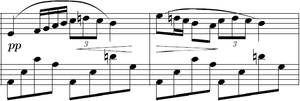Nocturne in C-sharp minor, Op. posth. (Chopin)

 |
|
| Problems playing this file? See media help. | |
The Nocturne No. 20 in C-sharp minor, Op. posth., Lento con gran espressione, P 1, No. 16, KKIVa/16, is a solo piano piece composed by Frédéric Chopin in 1830 and published in 1870.
Chopin dedicated this work to his older sister, Ludwika Chopin, with the statement: "To my sister Ludwika as an exercise before beginning the study of my second Concerto".[1][2] First published 26 years after the composer's death, the piece is usually referred to as Lento con gran espressione, from its tempo marking. It is sometimes also called Reminiscence.[3][4] The piece was famously played by Holocaust survivor Natalia Karp for the Nazi concentration camp commandant Amon Goeth, with Goeth being so impressed with the rendition, that he spared Karp's life.[5]
Musical structure

The composition is marked Lento con gran espressione and is written in common time. After a soft, sad introduction, the main theme starts at bar 5, with the left hand playing broken chords in portamento slurs throughout the section, imparting a haunting and continuous quality to the music. The theme then shifts to a dreamy pianissimo in bar 21, before returning to the original theme in bar 47, and finally concluding with a Picardy third. The first two bars of the theme from the middle section (bars 21 and 22), resemble the main theme from the third movement of his own second piano concerto in F minor which was composed around the same time (1830). The next two bars (bars 23 and 24) resemble the second part of the secondary theme of the first movement from his second piano concerto. The passage in the middle section of the nocturne in 3/4 time starting in bar 33 resembles the scherzando section of the third movement of the second piano concerto starting in bar 145 in which the left and right hand are playing an octave apart.

In popular culture
- The Nocturne is featured in the Roman Polanski film The Pianist. It is played twice (both times incompletely) in the film, at the beginning and at the end, by the protagonist Władysław Szpilman, at the recording studio at Warsaw Radio. The complete piece is provided in the soundtrack, played by Polish classical pianist Janusz Olejniczak.
- It is also featured in Terminator: The Sarah Connor Chronicles, in episode 7 of Season 1. Towards the end of the episode, Cameron dances ballet to the piece.
- This piece is played briefly in episode 1 of season 1 of Foyle's War by David Horovitch's character Thomas Kramer near the beginning of the episode.
- Classically trained R&B/Soul singer Alicia Keys samples the piece in "As I Am (Intro)" from her 2007 album "As I Am".
- A version played by violin is featured in the 2010 film The Karate Kid starring Jackie Chan and Jaden Smith.
- It is also featured in the 1997 action thriller The Peacemaker (with George Clooney and Nicole Kidman) at 1:02:42.
- Nneka Lucia Egbuna, a Nigerian-German hip hop/soul singer, also uses a sample from this piece of work in her song "My Home".
- It is also featured in The Killing at the beginning of episode 4 of Season 4.
- It was also featured in the horror movie the innkeepers, played by a ghost in one of the movies dramatic scenes.
- It is also played during a Quarantine Zone in the video game Dying Light.
References
- ↑ Narodowy Instytut Fryderyka Chopina
- ↑ Murdoch, William (1935). Chopin: His Life.
- ↑ http://en.chopin.nifc.pl/chopin/manuscripts/detail/id/250
- ↑ http://www.amazon.ca/Nocturnes-Comp-Fryderyk-Chopin/dp/B000001GPN
- ↑ Charters, David. "Natalia Karp". Liverpool Daily Post. Retrieved 2008-04-02.
External links
- Nocturne in C sharp minor: Scores at the International Music Score Library Project
- Free sheet music of Nocturne No. 20 in C-sharp minor from Cantorion.org